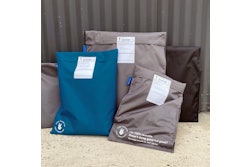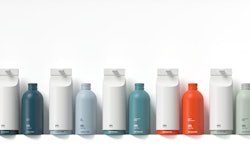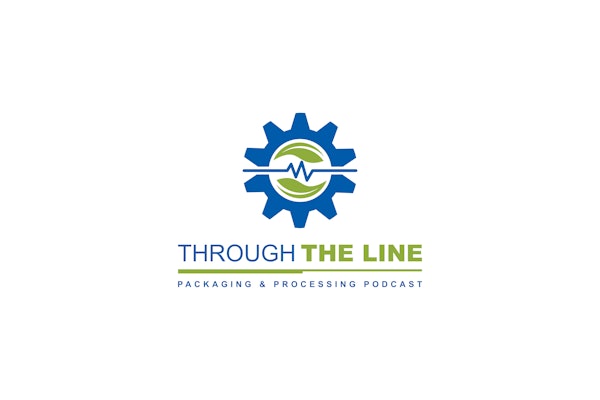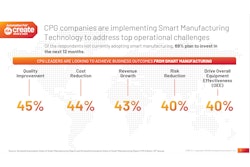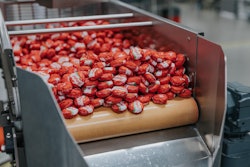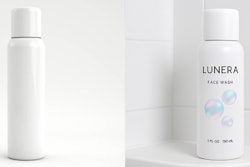Want to view the rest of this pertinent conversation? Find the full free video here: Sustainable Packaging TODAY — Full Webinar
Listen to the story here:
 | Read the transcript below: |
Matt Reynolds: Hello and welcome to today's webinar. I'm Matt Reynolds editor of Packaging World Magazine and I'm here with Paul Jenkins, Managing Director of the PackHub.
Paul Jenkins: Okay, so the first innovation I'd like to talk about today is one which is part of a growing packaging trend area which is around reusable and refillable packaging. And what we've got here is multinational packaging and paper group Mondi, who have collaborated with a German chemical and consumer goods company Henkel to launch 100% recyclable and refillable pouches for Henkel's dishwashing brand Pril. For the German market, it is reported that the pack's plastic content has been reduced by 70% from previous iterations, and it is to be used as to refill and recycle PET pump dispenser bottle. Simple and light-to-carry, consumers can easily empty the packaging without leaving any waste product within—due to its ergonomic design. The collaboration benefits both company's goals of packaging all of their products in 100% recyclable or reusable materials by 2025. And indeed, many brands, retailers, and packaging suppliers are working to that goal for the year 2025. This is a typical example of a refill execution and clear branding on the front to sort of direct the consumer to what they need to be doing. And a clear message that it's saving plastic usage across the top as well. So just quite a good example to get us on the go.
Matt Reynolds: Yeah, and that's I mean, that's a key element that you bring up there is is consumer education, there's this is another example from Kao Corp. And they use what's called the "bottle for life." It's not necessarily for life, but they aim for at least 100 cycles of use and refills, so the bottle for life is meant to be beautiful. In this case, MyKirei is the brand within Kao Corp. You can see that the dispensers actually dispenses hand soap in shapes for children, like a flower or a paw print. So something interesting to keep kids interested. These are beautiful bottles that can withstand many, many cycles and remain in your bathroom for you know, months and months. You'll be continually refilling them with the package on the left. And the package on the left is actually plastic. It's a flexible stand up pouch for the hand wash. The system reports to reduce packaging by more than 85% compared to rigid packaging. And what's interesting is the bottle for life is HDPE. The replacement film pouches are actually in line with TerraCycle. So somebody can refill their botte and then they can send them back by mail—free of postage—to TerraCycle. And TerraCycle is able to then reuse that stand-up film pouch. So again, another interesting example where consumer education is key.
Paul Jenkins: So what I particularly like about this is not just the consumer education piece, but also the fact that they're supporting the changes through talking about the percentage reduction in plastic and things like that. So they're not just making the changes, they're actually supporting that with some evidence of why it's a good thing from a sustainability point of view.
Matt Reynolds: Here we have another one. That's another concentrates example. This is from Truman's, I believe they have a newer version of this, this might be a slightly older image. But what they do is they offer up starter kits and a starter kit would be composed of in this case, for durable bottles, they're I believe they're durable PE T again, this might be about a year old, so they may have shifted into other materials, but they're durable bottles that are uniquely made to have a cylindrical cone shaped neck. And then these concentrated tubes which you can see here, there's a four on the bottom, there's a one quart color corresponds one for bathroom, one for kitchen, one for wood, wood surfaces, that sort of thing. And each one fits nicely into the neck of that bottle. So basically a consumer puts that cartridge into the neck of that durable reusable bottle fills it with water and then when they screw the the nozzle closed that opens up the cartridge the concentrate is released into the bottle below. Again, you're shipping only a very small amount of liquid a very small amount of water, the consumer adds the water at home. So another example of reusable recyclable excuse me reusable refillable technology here that you know will be the durable package will be used over and over and over again and only this very lightweight, cylindrical refill cartridge will be mailed to you. So again, optimize is in the whole situation.
Paul Jenkins: Absolutely. And personally, I think that would be quite a fun thing to do as well.
Matt Reynolds: It is they have fun little messages on the inside of the box and everything. It's a cool it's a cool thing.
Paul Jenkins: Next up, Unilever in the U.S. has launched its Dove body wash in a reusable and refillable format. Consumers have the choice of two different options. The more expensive option is the Dove reusable aluminum bottle and body wash concentrate which is priced at just under $15 US dollars. It's comprised of an aluminum bottle and a squeezable concentrated body wash, which is a four ounce bottle that is four times concentrated, and when diluted with water makes up to 16 ounces of body wash. Yet again, another example of effectively taking water out of the supply chain and adding it the last moment of consumption. The body wash concentrate bottle uses 50% less plastic than a standard bottle—again communicating that plastic reduction message—and is made from recycled plastic. The other option is Dove's reusable bottle and body wash concentrate, which has a recycled reusable plastic bottle along with a concentrated body wash and retails for $9.99. The refill concentrates—both formats—are available in three scents. And what I particularly like about this, it's bang on trend in terms of encouraging usage of refillable and reusable packaging. I like the fact that they've done it as a set, because consumers need to know how to navigate this sector. This is new to them. This is different to what they've done before. So Dove and Unilever have tried their very best to do like a duo pack like this, to really get consumers and set them on their path to hopefully be a long term consumer of this packaging format.
Matt Reynolds: Yeah, that's that's a good point and setting consumers up to succeed. And we won't belabor this any further because clearly, you know, Dove and Unilever are way out in front in this case.
This is a deodorant pack that's a stainless steel pack reusable. And then the refill in this case is in an FSC certified carton board. Unilever and Dove seem to get it. This is again, that circular model. Consumer education is key to make sure that people succeed early on, because if they don't know what they're doing, and they can't figure it out, then that results in waste and waste works against the sustainability goals that we're trying to accomplish.
Paul Jenkins: Another product area that has been under pressure to improve this sort of sustainability is sort of the single use coffee cup market. So we've seen a number of big developments in terms of improving the recyclability of paper cups. But also, the reusable format is really starting to get some traction with lots of small testing around the world. And here we have an example Starbucks and Singapore who have partnered with a reusable packaging business called Muse to launch a borrow a cup program. In just mostly just three Starbucks doors in the in the National University of Singapore. The scheme works by customers entering entering a store, I'm requested to borrow a cup. Using the Muse app on their smartphone, they can scan a QR code on the cup as you can see in the picture. Once finished, the customer dropped a cup off at any one of six return stations on campus. The customer will then be collected and watched before use customers will receive a discount of 50 Singapore dollars on each drink. The one size cup is suitable for any Hong Kong drink. Apparently, the customer has 14 days to it a challenge around incentivizing consumers to participate in the scheme. So it's very well them using the cup but they need to return it for it to work for the environment. So in this case, the customer has 14 days to return the cup and will be sent a reminder email once overdue, if the cup is not returned, after 30 days, a fee of $4 will be charged and knowing how students probably don't give back their library books that could be quite an expensive exercise but quite an interesting punitive charge there to encourage the need to back into the back into the supply chain.
Matt Reynolds: And that puts a bow on everything that brings us to the conclusion of the webinar all the time that we have. Naturally, If you'd like to learn anything more about what we've discussed or like to discuss more with us, visit the websites that you see on your screen right now. Use the email addresses to contact Paul or I. That's all the time that we have for today.


